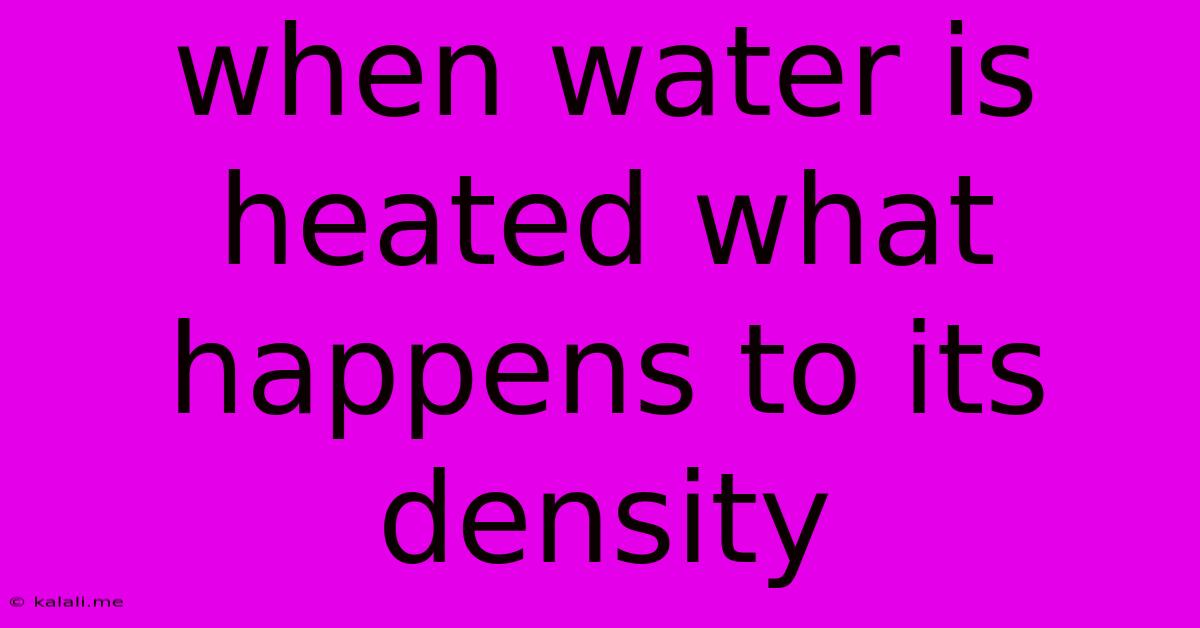When Water Is Heated What Happens To Its Density
Kalali
Jun 13, 2025 · 3 min read

Table of Contents
When Water is Heated: What Happens to its Density?
Water, the elixir of life, exhibits unique properties that set it apart from other substances. Understanding how its density changes with temperature is crucial in various fields, from meteorology to engineering. This article delves into the fascinating relationship between water temperature and density, explaining the science behind this seemingly simple phenomenon.
When water is heated, its density generally decreases. This is a common observation applicable to most substances. However, water is an exception and displays anomalous behavior, particularly around its freezing point. This anomaly has profound implications for aquatic life and global climate patterns.
The Expansion of Water Molecules
The primary reason for the decrease in density when water is heated is the increase in kinetic energy of its molecules. As temperature rises, water molecules gain energy and move more rapidly. This increased movement causes them to spread further apart, resulting in a larger volume for the same mass. Since density is mass per unit volume (ρ = m/V), an increase in volume with constant mass leads to a decrease in density. Think of it like shaking a container of marbles—the more vigorously you shake, the more spread out the marbles become.
The Anomalous Expansion of Water: A Unique Property
While the above explanation holds true for most temperature ranges, water shows a peculiar behavior between 0°C (32°F) and 4°C (39.2°F). In this narrow temperature range, water increases in density as it is heated. This means that water is densest at 4°C. As it cools below 4°C towards the freezing point (0°C), it expands and its density decreases. This unusual expansion upon freezing is responsible for several crucial phenomena:
-
Ice floats: Because ice is less dense than liquid water, it floats on the surface. This prevents bodies of water from freezing solid, allowing aquatic life to survive even in sub-zero temperatures. The insulating layer of ice on the surface also protects the water below from further freezing.
-
Lake stratification: In winter, the colder, denser water sinks to the bottom of lakes, while the warmer, less dense water remains at the surface. This creates layers of water with different temperatures and densities, a phenomenon known as thermal stratification. This stratification plays a role in the distribution of nutrients and oxygen within the lake ecosystem.
-
Ocean currents: The density differences caused by temperature variations in water are major drivers of ocean currents, which are crucial for global heat distribution and climate regulation.
Implications and Applications
Understanding the density changes in water is crucial in various fields:
- Oceanography: Density variations drive ocean currents and affect the distribution of marine life.
- Meteorology: Water density plays a role in cloud formation and precipitation.
- Engineering: The expansion of water upon freezing needs to be considered in the design of structures and infrastructure, particularly in cold climates. Pipes need to be insulated to prevent damage from freezing water.
In conclusion, while the density of water generally decreases with increasing temperature, its anomalous behavior around its freezing point is a remarkable exception. This unique property has profound implications for the environment and various scientific and engineering applications. Understanding this behavior is key to comprehending the complex dynamics of our planet's climate and ecosystems.
Latest Posts
Latest Posts
-
Capacity Of Doing Work Is Called
Jun 14, 2025
-
Which Of The Following Statements About Big Data Is Correct
Jun 14, 2025
-
Simplify The Square Root Of 34
Jun 14, 2025
-
A Light Year Is A Measurement Of
Jun 14, 2025
-
What Is The Prime Factorization Of 132
Jun 14, 2025
Related Post
Thank you for visiting our website which covers about When Water Is Heated What Happens To Its Density . We hope the information provided has been useful to you. Feel free to contact us if you have any questions or need further assistance. See you next time and don't miss to bookmark.